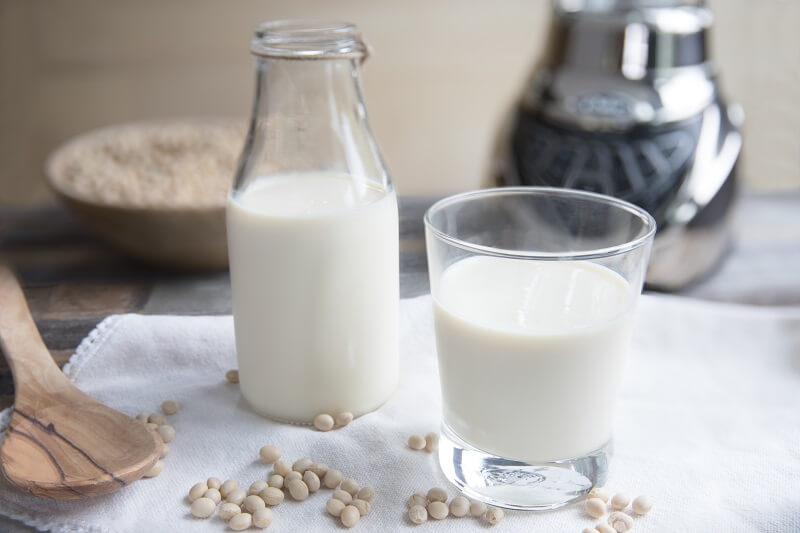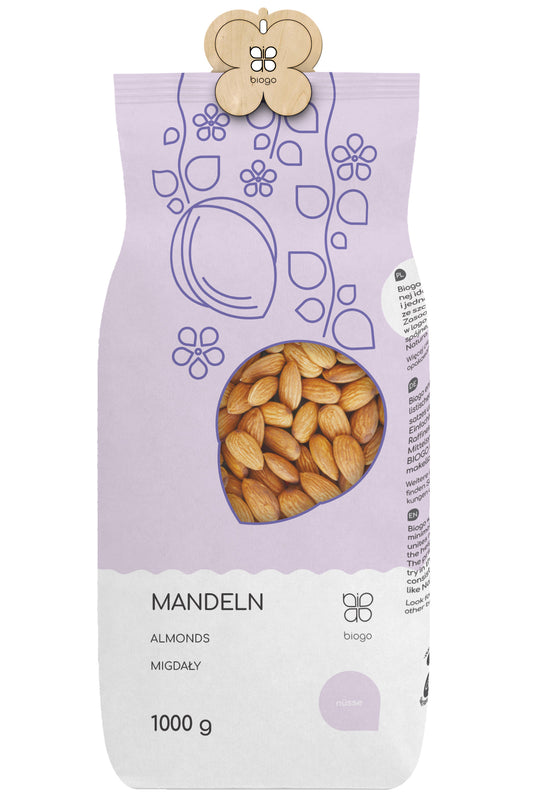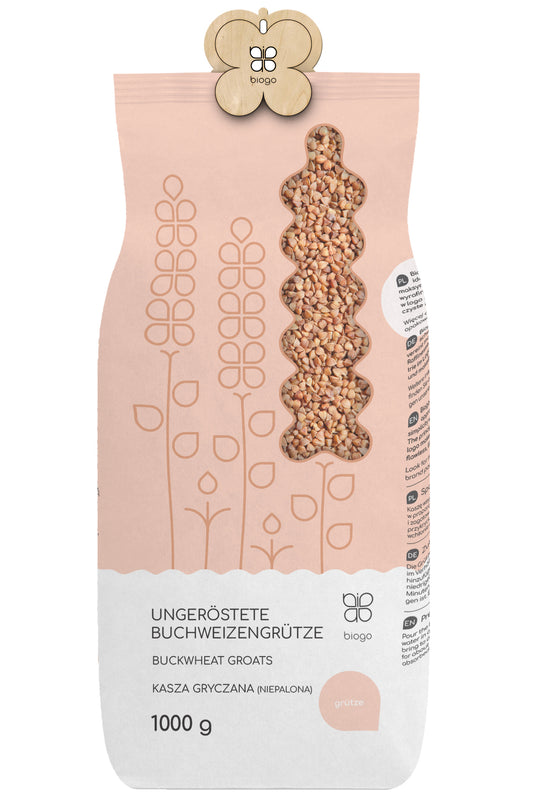CONTENU:
- L'origine de la boisson végétale
- À qui conviennent les boissons végétales ?
- Boissons végétales et lait de vache
- Les boissons végétales les plus populaires
- Résumé
Les boissons à base de plantes ont pris d’assaut les rayons des magasins ces dernières années. Votre sélection s'agrandit chaque année. Ils diffèrent non seulement par la matière végétale à partir de laquelle ils sont fabriqués, mais également par les différents additifs et saveurs. Tout cela conduit au fait que l’on peut ressentir une sorte de vertige lorsqu’on se trouve devant l’étagère du magasin. Nous avons donc décidé de les décrire plus en détail et de passer en revue les différences fondamentales entre eux. Nous répondons également à la question de savoir s’ils peuvent être une bonne alternative au lait de vache ? Nous vous invitons à lire.
L'origine de la boisson végétale
Jusqu'à récemment, on l' appelait encore lait végétal . En 2018, la situation a changé et depuis lors, les fabricants ne peuvent plus étiqueter leurs produits comme du lait végétal. Cela était dû à la directive qui définissait clairement le terme « lait ». Il s'agit d'un produit d'origine exclusivement animale et, de plus, d'une sécrétion des glandes mammaires des mammifères. Cela ne change cependant rien au fait que les boissons à base de plantes sont le substitut le plus populaire au lait de vache, de chèvre, de brebis ou de bufflonne. Ainsi, malgré le retrait officiel de cette appellation, le terme « lait végétal » a toujours sa fonction et est fermement ancré dans la société. Les boissons à base de plantes sont généralement fabriquées à partir de graines oléagineuses ou de noix. Dans l’industrie, on utilise le procédé d’extraction de l’eau pour les produire. Il s’agit d’un processus au cours duquel certains nutriments du matériau de base pénètrent dans l’eau. Les composés chimiques migrent d’un environnement à concentration plus élevée vers un environnement à concentration plus faible. Une fois l’équilibre atteint, les deux liquides sont séparés. Il s’agit bien sûr d’un modèle simplifié de la formation des boissons végétales, mais il reflète bien les principales hypothèses de ce processus. Cela peut également être causé par le mélange de matières végétales avec de l’eau. De cette façon, nous pouvons facilement préparer une telle boisson à la maison. Très souvent, des composés chimiques supplémentaires sont ajoutés au produit final pour améliorer ses propriétés nutritionnelles ou organoleptiques. Il peut s’agir par exemple de sucre, de calcium, de vitamines ou de protéines.
À qui conviennent les boissons végétales ?
Le lait végétal peut être consommé par tout le monde et, contrairement à la croyance populaire, n’est pas réservé aux végétaliens ou aux végétariens. C'est un produit comme un autre, mais qui possède plusieurs propriétés qui en font potentiellement un bien meilleur choix que le lait de vache conventionnel. Ils constituent certainement un excellent choix pour ceux qui ne peuvent pas consommer de lait pour diverses raisons. On parle par exemple d’une allergie aux protéines du lait de vache, d’une intolérance au lactose ou de problèmes idéologiques. Ils constituent également une sorte de changement et une sorte de tremplin par rapport au lait d’origine animale. C’est sans doute parce que pratiquement toutes les boissons à base de plantes ont un goût légèrement différent selon les matières premières utilisées. En outre, il existe également des boissons aromatisées et des boissons destinées à des groupes cibles spécifiques, par exemple B. pour les sportifs (avec une teneur en protéines accrue) ou pour les diabétiques (avec une teneur réduite en matières grasses et en sucre).
Boissons végétales et lait de vache
Les boissons à base de plantes ont des teneurs nutritionnelles différentes selon le type de matière première utilisée et les éventuels additifs. Il convient toutefois de noter qu’ils n’en contiennent généralement pas autant que la matière végétale utilisée pour leur production. Cela est dû au processus de production lui-même, où les nutriments des graines oléagineuses/noix pénètrent dans l’eau. Cela ne change cependant rien au fait qu’ils constituent toujours une source très précieuse de macro et micronutriments. Cependant, gardez à l’esprit que toutes les boissons à base de plantes ne sont pas aussi riches en calcium et en protéines que le lait de vache. Ces boissons sont souvent enrichies de ces substances. Cependant, si le lait animal est complètement évité et remplacé par des boissons à base de plantes, l’apport en calcium et en protéines provenant d’autres sources doit être augmenté. Il est également utile de savoir comment choisir une boisson végétale. La variété des variétés, des marques et des saveurs fait que d'une part chacun peut trouver quelque chose pour lui, mais d'autre part le choix devient difficile. Lorsque vous commencez votre aventure avec les boissons à base de plantes, cela vaut la peine d'en essayer plusieurs et de vérifier celles qui vous conviennent et celles qui ne vous conviennent pas. Comme pour presque tous les produits disponibles sur le marché, la composition est très importante. Plus c'est court, mieux c'est. Faisons également attention aux additifs utilisés et essayons de choisir les plus naturels. L’ajout de sucre à ces boissons est également courant. Essayons de choisir autant que possible des produits non sucrés et sans ingrédients inutiles. Il convient également de mentionner que le prix de ce type de produit est généralement plus élevé que celui du lait de vache. Il y a plusieurs raisons à cela et cela dépend en grande partie du fabricant et de la qualité de la boisson à base de plantes elle-même. Le fait que la production de lait de vache soit, paradoxalement, beaucoup moins chère et beaucoup plus répandue a également un impact majeur. Les boissons à base de plantes, en revanche, sont des produits relativement nouveaux avec un cercle plus restreint d’acheteurs potentiels.
Les boissons végétales les plus populaires
Comme déjà mentionné, il existe de nombreux types de boissons à base de plantes. Il est impossible de les décrire tous de manière exhaustive. Néanmoins, nous nous concentrons sur les plus populaires, les plus utilisés et surtout les plus naturels.
boisson au soja
La boisson au soja a été l’une des premières boissons de ce type à arriver sur le marché. Il est très similaire au lait de vache, tant en termes de valeur nutritionnelle que de consistance. Il est riche en acides gras insaturés, mais ne contient en même temps ni cholestérol ni lactose. Bien sûr, il ne contient pas de protéines de lait, mais il faut se rappeler que le soja peut être un allergène tout aussi puissant. La boisson au soja est fabriquée à partir de graines de soja moulues, d’eau, d’huiles végétales et parfois de poudre de protéines de soja. Un tel produit est généralement également enrichi de diverses vitamines et minéraux, notamment de calcium. En prenant en compte tous ces ingrédients, nous obtenons finalement une boisson qui est un très bon substitut au lait de vache. Il contient des niveaux relativement élevés de protéines végétales et constitue une bonne source de glucides et de vitamines B. Il est à noter que le calcium contenu dans les boissons au soja est absorbé et utilisé par notre corps presque dans la même mesure que celui des produits animaux. Le calcium contenu dans les boissons au soja est absorbé et utilisé par l’organisme presque de la même manière que dans les produits d’origine animale. Il contient également beaucoup plus de fibres que le lait de vache. Il convient également de mentionner les phytoestrogènes contenus dans le soja. Ils sont également présents naturellement dans la boisson fabriquée à partir de cette plante. Ce sont des composés chimiques d’origine naturelle qui jouent un rôle similaire dans l’organisme à celui des œstrogènes. C’est pourquoi le soja n’a pas eu une bonne réputation au début. On leur attribue des effets cancérigènes. On dit qu’ils augmentent le risque de cancer du sein et provoquent une hyperthyroïdie. Ces craintes n’ont pas été confirmées par la recherche et les boissons au soja sont désormais un substitut très apprécié au lait de mammifère.
boisson aux amandes
La boisson aux amandes est sans aucun doute le représentant le plus populaire des boissons végétales à base de noix. Comparé au soja, il est incomparablement plus léger et moins expressif en goût. Bien que les amandes soient une assez bonne source de protéines et de calcium, on ne peut pas en dire autant d’un produit à base d’amandes. Cependant, le lait d’amande contient beaucoup moins de ces nutriments que le lait de vache. Cependant, il se caractérise par une faible teneur en calories, une grande buvabilité, la présence de graisses végétales saines, de potassium, de manganèse, de zinc et de vitamine E. Il est intéressant de noter qu'il est relativement fréquemment sucré. Il convient donc d’accorder une attention particulière à la composition. C'est une solution idéale pour les personnes allergiques aux protéines du lait de vache et au soja. Cependant, les personnes allergiques aux noix devraient éviter d’en manger.
boisson à l'avoine
La boisson à l'avoine est généralement préparée en mélangeant des flocons d'avoine avec de l'eau, puis en filtrant le liquide. Il est assez fade et faible en calories, mais sa consistance peut être similaire à celle du lait de vache. Il est intéressant de noter qu’il contient un type spécifique de fibre : le bêta-glucane. Grâce à son contenu, il peut aider à réduire la tension artérielle. C'est également une bonne source de vitamine E, d'acide folique et de riboflavine. Il ne contient pas de graisses saturées ni de cholestérol. Cependant, gardez à l’esprit qu’il contient beaucoup de glucides. C'est donc l'une des boissons végétales les plus sucrées. Il peut y en avoir deux fois plus que dans le lait de vache. Il n’est donc pas particulièrement recommandé aux diabétiques. Ajoutons qu’il ne contient presque pas de protéines et de calcium. Il est donc préférable de rechercher des produits enrichis en ces nutriments. De plus, il ne doit pas être consommé par les personnes souffrant d’intolérance au gluten ou de la maladie cœliaque, ainsi que par les jeunes enfants.
boisson au riz
La boisson au riz se caractérise par un goût légèrement sucré et une consistance pas trop épaisse. Il est hypoallergénique, faible en calories et facilement digestible. Il contient de nombreux antioxydants qui aident certainement à combattre les radicaux libres et à ralentir le processus de vieillissement du corps et de la peau. De plus, on y retrouve des vitamines B, des phytostérols végétaux, du calcium et du phosphore. Il ne contient ni cholestérol ni lactose. Malgré ses nombreux bienfaits, cette boisson n’est pas recommandée comme substitut principal du lait de vache. Cela est dû à la présence possible d’arsenic, qui est toxique pour notre corps. Cet élément est absorbé par le riz à partir du sol et peut ensuite se retrouver dans le produit fini. Les femmes enceintes et les jeunes enfants ne doivent pas en boire.
Boisson à la noix de coco
Contrairement aux apparences, la boisson à la noix de coco n’a rien à voir avec l’eau de coco. Il est fabriqué à partir de la chair de la noix de coco. Il se caractérise par une délicate saveur de noix de coco et ne contient ni lactose ni protéines de lait de vache. On y retrouve pratiquement les mêmes nutriments que dans la chair de la noix de coco. La boisson à la noix de coco est riche en manganèse, cuivre, fer, sélénium et acides gras. Il peut également avoir des effets antibactériens, cardioprotecteurs et anti-inflammatoires, mais aussi soutenir les processus digestifs. Cependant, il contient relativement peu de protéines, de glucides et de calcium. Il convient de noter que le sucre est un additif courant dans cette boisson végétale. Tout cela le rend assez riche en calories et le lait de coco seul ne peut pas remplacer complètement le lait de vache. Cependant, en tant que type de complément alimentaire, il fonctionne parfaitement.
Résumé
Les boissons à base de plantes représentent un groupe de produits très large. Nous nous sommes toutefois concentrés sur les plus populaires. Certains conviennent certainement comme substitut au lait de vache, d'autres sont un peu moins efficaces dans cette tâche. Néanmoins, cela vaut vraiment la peine d’essayer ces produits et de voir si vous les aimez. Ajoutons que les raisons sanitaires ou idéologiques ne doivent pas toujours être la raison de leur consommation. Il vaut toujours la peine de varier son alimentation quotidienne et de découvrir de nouveaux aliments.
LE CHOIX DE L'ÉDITEUR
Dattes séchées 1 kg BIOGO
- £4.00
£5.00- £4.00
- Prix unitaire
- / par
Amandes 1 kg BIOGO
- £11.00
£13.00- £11.00
- Prix unitaire
- / par
Graines de tournesol décortiquées 1 kg BIOGO
- £3.00
£4.00- £3.00
- Prix unitaire
- / par
Mangue séchée bio 400 g BIOGO
- £10.00
- £10.00
- Prix unitaire
- / par
Mûres blanches séchées 500 g BIO
- £6.00
£7.00- £6.00
- Prix unitaire
- / par
Popcorn (grains de maïs) bio 1 kg BIOGO
- £6.00
- £6.00
- Prix unitaire
- / par
Curcuma moulu bio 500 g BIOGO
- £6.00
- £6.00
- Prix unitaire
- / par
Graines de chardon-Marie 1 kg BIOGO
- £4.00
- £4.00
- Prix unitaire
- / par
Noix de cajou bio 1 kg BIOGO
- £18.00
- £18.00
- Prix unitaire
- / par
Gruau de sarrasin non décortiqué 1 kg BIOGO
- £3.00
£3.00- £3.00
- Prix unitaire
- / par







































































































































